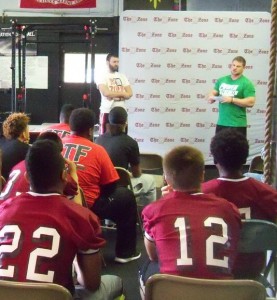The D-Zone Recruiting Re-cap
It’s that time of year for underclassmen to attend their college recruiting camps and plan some visits. It can be a hectic and stressful time for these athletes as they pursue a dream. Working with 70+ college athletes the last few years alone, we’ve seen this firsthand and want to provide a little of what we learned.
Last month we had The DZone, operated by Jeff Corrion, come and give a talk to area athletes and parents looking to pursue opportunities at the collegiate level. If you haven’t followed them yet, find them on Twitter (@TheD_Zone) and complete their free online player profile.
While playing at the next level may not be a goal for everyone, it never hurts to explore the process and work towards having options when the time comes. The 9th-11th grade athletes that attended this free event got their picture taken for their profile and took away some key points. Here are just a few of the main ones:
- Your high school coach is going to be able to do the most for you. Talk with them and map out a plan. What high school doesn’t want as many athletes as possible representing them at the next level? On the other hand, remember that coaches are busy people.
- Break inertia. Fill out questionnaires on college websites and make contact with coaches/recruiting coaches. This is something the athlete must do – not the parents or high school coaches.
- Get as much face time as your can with coaches. Attend one-day camps and unofficial visits. This gives them a chance to see what type of person and athlete you are – also your personality and attitude. Be proactive when there and be friendly.
- Do your research on the school, the football program, and the academic standards ahead of time. Know which schools can offer which scholarships. If you weren’t playing ball, would you still want to attend? Does it have the educational programs you want? Do you like the social scene?
- Have your highlight tape(s) ready with all the links laid out neatly and orderly. Be personable, respectful, and grateful in your emails – don’t mass email. Make it concise and include any contact info of yours, or your coaches, they would need. Don’t have a ton of grammatical errors, silly music in your videos, and make sure your videos are edited and highlight you.
I was also able to speak and share a few insights on what we see all the time “behind the scenes”. We usually work with an athlete well before this process so we can guide them through it. Here are a few things that I touch on and always reiterate:
- Actually be good at playing your sport. Don’t let combine numbers mask your ability to what you can do on the field. Yes, it helps to be athletic and you should practice these drills ahead of time (we take the time to teach our high school kids the same thing we teach our NFL combine and pro day guys), but don’t lose sight of long term athletic development and actual field skills.
- Be realistic about what level you want to pursue and what the best fit would be for you.
- Don’t make them not like you. Show up on time. Look the part. Be respectful. Listen and follow directions. Be grateful. Know how to give a proper handshake and make eye contact. Follow-up properly. Parents shouldn’t hover but should be educated. Don’t be an idiot on social media. These are all things we reiterate on a daily basis as young men typically aren’t good at displaying these qualities.
- Do what others won’t. By “others” I mean the majority of athletes on your team and your age. They won’t want to seek out extra training or guidance as their goals may be different from yours. How many kids went on to play college ball the last couple years at your school? Compete against (and with) those who are on the same path as you.
- Train smart and with like-minded athletes. Iron truly sharpens iron. Find those who can hold you accountable and demand the best out of you. Don’t be a big fish in a small pond. Our PSTS athletes have the benefit of this. They also have the benefit of getting an education on what a college weight program will be like. Then 3-4 months before they report, they join our current college athletes to experience the intensity and social dynamic firsthand.
- *Bonus Tip* – Have a plan for your visits/camps/combines. Get out your calendar and plan your schedule. I’ve seen firsthand how disastrous forgetting this can be. Do you know how taxing it is to run maximal 40yd dashes three times in 5 days? Let alone perform all the other camp drills or tests at full speed and do them well. This is stupid and you won’t get faster. You’ll get hurt and it will linger throughout the season or longer.
By no means is this the end-all be-all of recruiting, as every situation is different. We hope this recap helped to shed some light on the basics. Maybe you learned something or maybe something was reiterated. All our athletes and parents will get a full recruiting report on everything we know about this process.
If you’re interested in pursuing college ball as an option, then let us know how we can help you.
-Mark Ehnis

